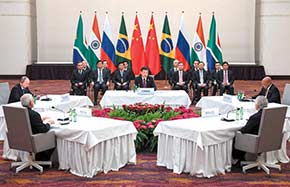US dilemma vs Sino-African opportunities
Many misappropriate the phrase "all politics is local" in our ever-globalizing society. They prioritize the significance of what happens on the home front above the events unfolding on the world stage and, for a variety of reasons, cannot be blamed for it.
But when it pertains to our nations' leaders, it becomes a different story. Today this is applicable more than any country to the United States, whose foreign policy stewards acknowledge China's increasingly important role in the economic development and political affairs of Africa but continue to disregard it. Opportunities for mutual benefit in the African continent are being squandered in the West and bearing fruit in the East.
When US President Barack Obama begins his trip to Africa later this month, one of the few undertaken during his two-term presidency which has called for dynamic "resets" and "pivots" elsewhere, the US will be under scrutiny for exhibiting complacency in the face of African pragmatism.
We have seen the US cite improperly yet near uniformly China's "no strings attached" integration policy into Africa as the root of American investment trepidation. Conversely and due in part to China's potentially stepped-up role under President Xi Jinping's leadership, a reality is emerging from across the developing world, one so eloquently stated by Brookings Institute's visiting fellow Yun Sun, who said: The US "is being increasingly edged out of the African continent both politically and economically", and there is less and less it can do about it.
Take Nigeria, for example, where the SLOK Group, the shipping corporation I chair, serves as one of the largest West African transporters of oil and gas to China. Despite the predicaments hindering our domestic trajectory, Nigeria has enjoyed a particularly rich history of cooperation with Chinese multinational enterprises, one that continues to be fostered and mutually cultivated.
The trade volume between Nigeria and China in 1994 was $90 million, which more than doubled to $210 million in 1995. And by 2000, it had climbed to about $830 million. In late April of this year alone, 20 Chinese companies indicated their interest in establishing manufacturing bases and offices in Nigeria, further cementing the nation's position as China's largest trading partner in Africa.





















